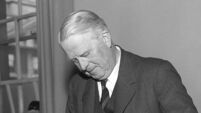Book review: Horrific figures of history who refused to accept their crimes

Chilean dictator General Augusto Pinochet in September 1997; he was arrested in London in 1998 for suspected genocide. File picture: Santiago Llanquin/ AP
- 38 Londres Street: On Impunity, Pinochet in England and a Nazi in Patagonia
- Philippe Sands
- Weidenfeld & Nicolson, £25
BOOKS & MORE
Check out our Books Hub where you will find the latest news, reviews, features, opinions and analysis on all things books from the Irish Examiner's team of specialist writers, columnists and contributors.







